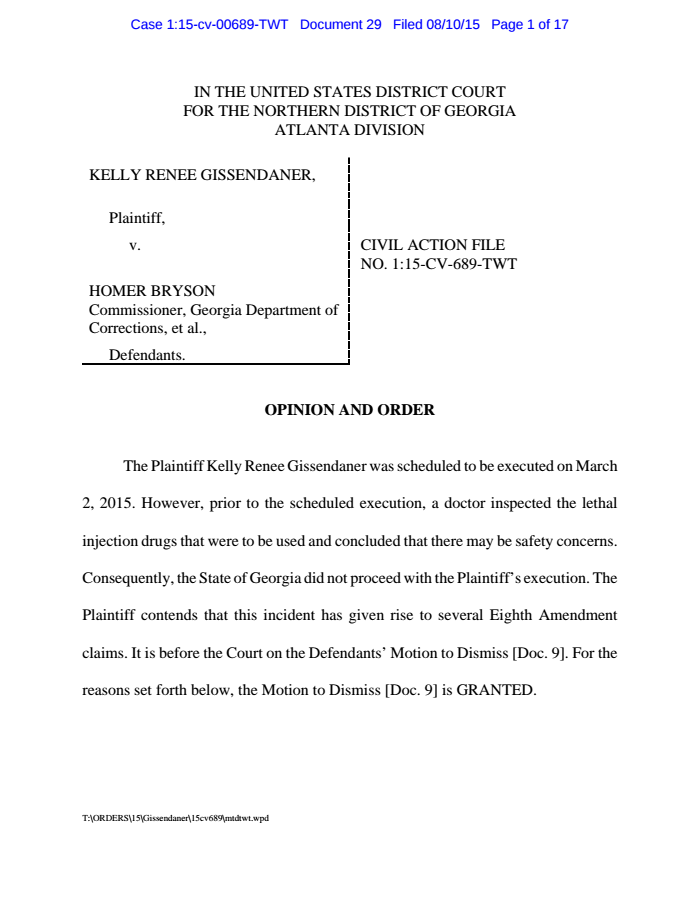Georgia's failed attempt to execute Kelly Gissendaner in March — an execution called off before officials began administering drugs — does not mean that the state is barred from trying to execute her again, a federal judge ruled on Tuesday.
U.S. District Court Judge Thomas Thrash dismissed a lawsuit brought by Gissendaner, whose scheduled execution was stopped after state officials noticed the lethal drug had particles floating in it.
The drug came from a secret compounding pharmacy. Compounding pharmacies mix drugs for specific prescriptions, unlike drug manufacturers, and their products have a high failure rate. Gissendaner's attorney argued before the execution that this would place her at a high risk for a botched execution — and said in the lawsuit dismissed on Tuesday that what happened in March proved her point.
She also argued she was the victim of cruel and unusual punishment when the state deliberated for hours on if it would use the drugs, causing her "immense fear and anxiety." But Judge Thomas Thrash disagreed, finding that the state "did not intentionally subject [her] to uncertainty for the sake of inflicting more pain upon her."
"It is not enough to show that the State may obtain defective lethal injection drugs," the judge wrote in dismissing the case. Gissendaner "must show that there is a substantial risk that the defective drugs will be used on" her in the future.
He added that "if anything, the March 2 incident shows that the state is unlikely to use defective drugs on" her.
Gissendaner was sentenced to death for convincing her boyfriend to kill her husband, Douglas Gissendaner, in 1998.
After deliberating for 13 hours in March, the state decided it would not use the "cloudy" drugs on her. Georgia officials said they would conduct an investigation to see what went wrong, and that it would do so with transparency.
Afterward, the state announced that the likeliest cause of the drug's defectiveness was how it was stored. Georgia argued that because the drugs were stored at too cold of a temperature, the drugs "precipitated." However, the state initially attempted to withhold the results of one experiment that disagreed with that narrative, and its own expert said another cause could be errors in how the pharmacy mixed the drug.
Georgia, like many other states, conducts its lethal drug deals in secret. It has not named, and has attempted to shift blame from, its supplier. The judge acknowledged that the secrecy would make it hard for Gissendaner to make her case.
"It may be true that the [state's] secrecy is the reason [Gissendaner] cannot utilize the March 2 incident to establish an Eighth Amendment claim," the judge admitted.
But Thrash added that "an accident" isn't sufficient to show cruel and unusual punishment under the Eighth Amendment. The March 2 incident "alone does not necessarily mean that it is significantly likely that defective drugs will be obtained again," Thrash said, adding that Gissendaner's claim amounts to speculation.
The bar for death row inmates to challenge their method of execution was set even higher after the U.S. Supreme Court's recent ruling made clear that inmates not only must show a method is sure or very likely to cause needless suffering — they must also produce an alternative execution method, which Gissendaner did not do. Her attorney declined to comment on the ruling.

